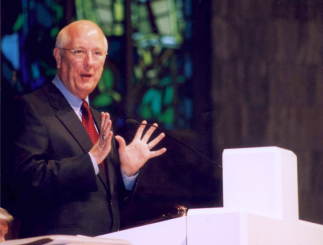Across Alabama and the nation, students are headed toward college campuses, some for the first time. Most Alabama students attend public colleges or universities but a growing number attend private Christian schools.
Samford University in Birmingham, the largest of the three institutions of higher learning cooperating with the Alabama Baptist State Convention, expects another record enrollment of freshmen this year. The University of Mobile (UMobile) and Judson College in Marion also plan to welcome large freshmen classes but final numbers will not be known for several weeks.
Samford, UMobile and Judson all offer Christian education. But what is that? Is it the traditional learning process with the trappings of chapel and required courses about the Bible stuck on?
In an essay published in the journal “Renewing Minds,” David Dockery, former president of Union University (a Baptist school in Jackson, Tenn.), wrote the purpose of Christian education is “helping students learn to think, live and serve Christianly.”
Educating students
In one sense, the task of Baptist schools is the same as that of public institutions — education. Students are expected to learn how to think critically and communicate effectively. They are to develop competencies in a specialized field while mastering general knowledge expected of an educated person.
The rigors of education are similar in both public and private schools. That is why many of the top regional universities in every part of the nation are Christian schools. Being Christian does not denote academic inferiority or sloppy scholarship.
However, Christian education does indicate a student focus not found on some public campuses. Some public universities are primarily research-oriented. Professors spend more time in research and writing than in classrooms. Baptist schools have a different focus — education of students. While research and writing are always encouraged for faculty, the schools are student-oriented, majoring on the educational process through faculty-student interaction.
Another difference between public colleges and universities and Baptist schools is highlighted by Dockery’s statement about “helping students learn to think, live and serve Christianly.” Baptist schools help students see the world from a Christian perspective or worldview.
The way one sees the world will largely determine if moral choices are guided by Christian principles, by what feels right at the time, by what makes the most people happy, by selfishness or some other motivator.
In their mission and core value statements all three Alabama Baptist schools announce their intention to help students think, live and serve “Christianly.”
Samford’s core values include “believe in God, the Creator of heaven and earth and in Jesus Christ, His only Son, our Lord” and “engagement with the life and teachings of Jesus.”
UMobile states it “explicitly seeks to integrate the critical pursuit of knowledge with biblical and spiritual awareness.”
Judson promotes “faith in God, adherence to Christian traditions, commitment to the ministry and mission of the Christian Church” and “making ethical decisions based on the life of Jesus Christ (and) the teachings of the Bible.”
Those statements are not just words on paper. They are stack poles around which the schools are built because schools hire faculty and staff that help them accomplish their mission. Schools hire for academic competencies. They hire for abilities to do a task be it teaching or some other assignment. And schools hire for ability to integrate Christian faith and learning because at the schools cooperating with the state convention, professors are expected to be guides for students as they develop faith-informed thinking and scholarship abilities.
That is the announced mission of each school.
It has been argued that a university is its professors. One writer observed that “if professors no longer profess the faith then the school cannot do its mission.” In one sense, that is true. When the professor no longer professes, Christian education is diluted down to just education. The unique characteristic offered by Christian schools is lost. That is why Christian schools make so much of their stated mission. With that in place every faculty candidate can be asked how their life history demonstrates commitment to and compatibility with that mission. It is a way to ensure that the schools continue hiring to accomplish their stated purpose.
At the same time, Christian education involves the culture of the school as well as what happens in the classroom.
Campus worship, Bible studies, prayer groups, campus chaplains, ministry opportunities, various Christian organizations, institutional priorities, modeling by professors and administrators and more all contribute to a campus culture different from most public institutions. So do prohibitions against certain kinds of conduct often accepted in secular circles.
Baptist institutions are not isolated from known sin. Fallen humanity expresses itself everywhere. If one seeks certain activities, then he or she will surely find them. But the culture of the Alabama Baptist-related schools all point toward communities of “service to God, to family, to one another.”
Blaming a Baptist school for the actions of a student who violates the standards of the college is as misguided as blaming a Sunday School teacher when someone misbehaves in a local church. Sometimes sin happens despite one’s best efforts.
Learning experience
The goal of Christian education is to offer a learning experience that connects mind, body and spirit. It does that through what happens in the classroom. It does that through faculty-student relations. It does that through campus culture. It does that through a community of believers working together to accomplish the mission of Christian education.
The contributions of our Baptist colleges are important to society, to the Church and to countless individuals. Their ministry deserves our support and our prayers.




Share with others: